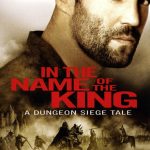Troy (2004)
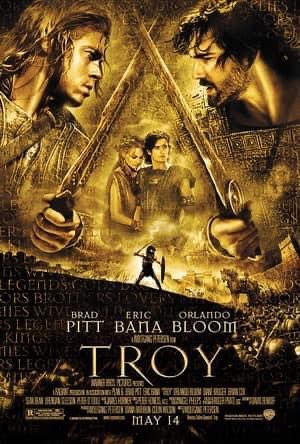
Troy (2004), directed by Wolfgang Petersen, is an epic war drama that reimagines Homer’s Iliad for a modern audience. With a star-studded cast led by Brad Pitt, Eric Bana, and Orlando Bloom, the film brings the legendary Trojan War to life with sweeping battles, political intrigue, and human drama. Though it takes creative liberties with the source material, Troy is a visually stunning and emotionally charged experience, blending myth and history into a grand cinematic spectacle.
Suggested videos for you:
Plot Overview
The film recounts the events leading up to and during the Trojan War, sparked by Paris (Orlando Bloom), a Trojan prince, who falls in love with Helen (Diane Kruger), the queen of Sparta, and takes her to Troy. This act of love incites King Menelaus (Brendan Gleeson) and his brother, King Agamemnon (Brian Cox), to launch a massive invasion of Troy to reclaim Helen and assert dominance over the region.
At the heart of the conflict is Achilles (Brad Pitt), a brilliant but conflicted Greek warrior whose personal motivations and relationship with his protégé, Patroclus (Garrett Hedlund), add complexity to the narrative. Opposing him is Hector (Eric Bana), the noble Trojan prince who fights to protect his city and family. Their clash becomes the emotional and dramatic centerpiece of the story.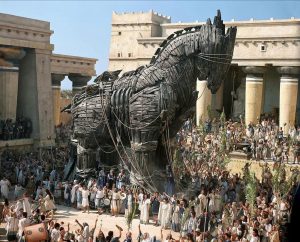
Themes and Tone
Troy explores themes of love, honor, ambition, and the futility of war. It presents the Trojan War as not just a clash of armies but a collision of personal ambitions and emotions, where pride, vengeance, and love drive nations into conflict. The tone strikes a balance between epic grandeur and intimate human struggles, though it leans more toward historical drama than mythological fantasy, with a grounded interpretation of the legendary events.
Performances
•Brad Pitt as Achilles: Pitt embodies Achilles with a blend of arrogance, physicality, and vulnerability. His portrayal captures the warrior’s internal conflict between glory and disillusionment, though some critics have noted that his stoic delivery lacks emotional depth at times.
•Eric Bana as Hector: Bana delivers a standout performance, bringing depth and humanity to Hector, a man torn between duty and his desire for peace.
•Orlando Bloom as Paris: While Bloom effectively conveys Paris’s youthful naivety and passion, his character often feels overshadowed by the more dynamic figures in the story.
•Diane Kruger as Helen: Helen, the “face that launched a thousand ships,” is portrayed with grace, though her character is underwritten, and her motivations remain somewhat opaque.
Brian Cox as the power-hungry Agamemnon and Peter O’Toole as the wise but doomed King Priam bring gravitas to their roles, adding layers to the political and emotional stakes.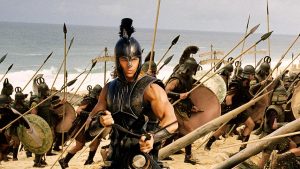
Production and Direction
Wolfgang Petersen crafts an impressive visual spectacle, with lavish sets, grand battle sequences, and sweeping cinematography that brings ancient Troy to life. The duel between Hector and Achilles is particularly memorable, showcasing both the brutality and honor of the era.
James Horner’s score enhances the epic scope of the film, blending haunting melodies with rousing themes that heighten the emotional impact.
However, the script occasionally falters with uneven pacing and dialogue that alternates between powerful and overly modernized. Additionally, the film’s decision to omit many mythological elements (such as the involvement of gods) grounds the story but diminishes some of its grandeur and mystique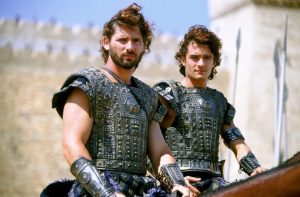 .
.
Legacy and Impact
Troy received mixed reviews upon release, with praise for its visuals and performances but criticism for its liberties with the source material and uneven storytelling. Despite this, it was a commercial success, grossing over $497 million worldwide and cementing itself as one of the definitive epic films of the 2000s. It has since gained appreciation for its ambitious scope and memorable moments, particularly the Hector-Achilles duel.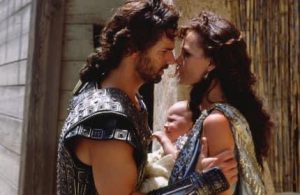
Conclusion
Troy is an ambitious and visually captivating retelling of the Trojan War that thrives on its epic scale and compelling central performances. While it may not fully capture the depth of Homer’s Iliad, it offers a rousing and emotionally charged experience that resonates with both fans of historical dramas and casual viewers.







